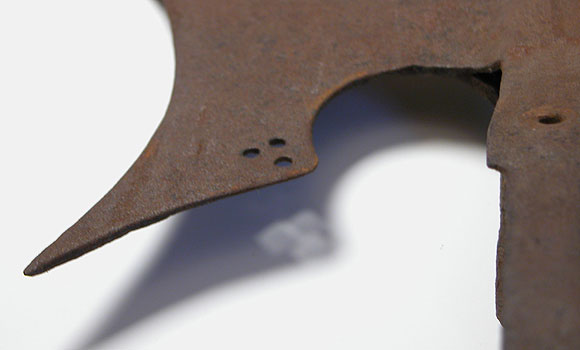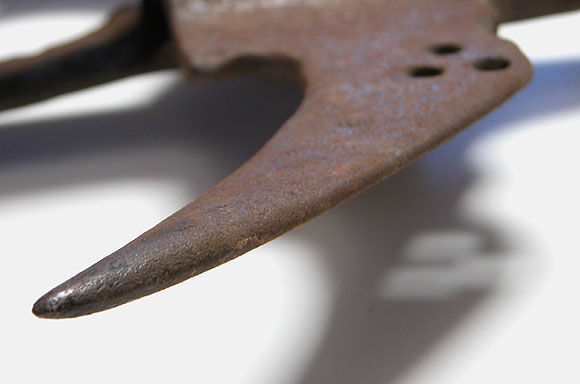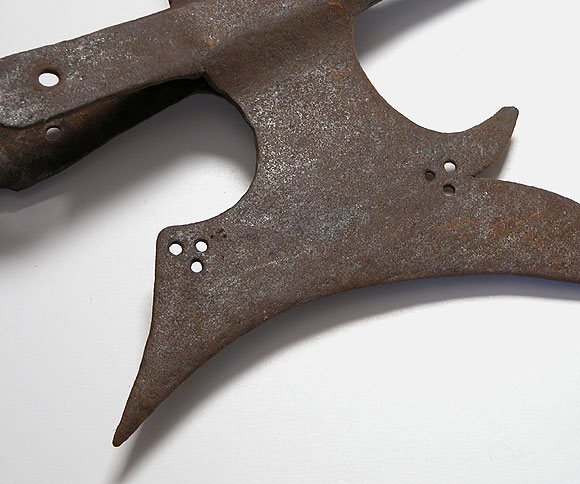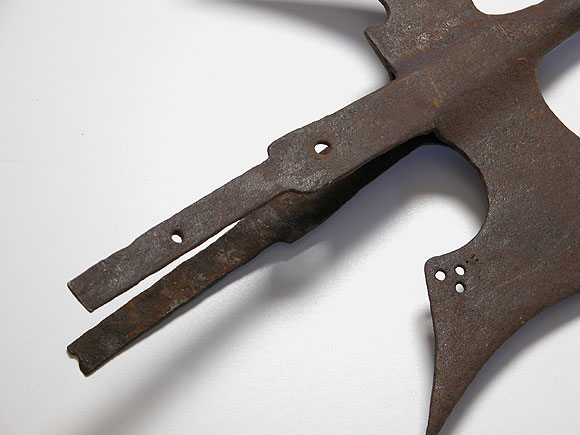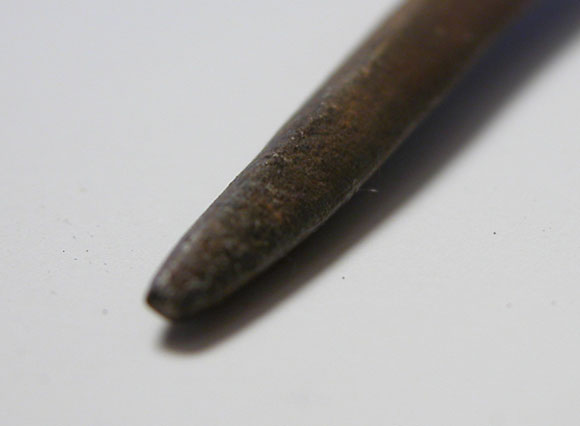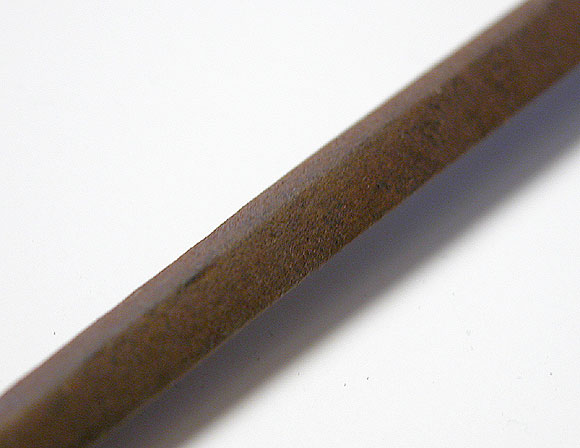Posts: 237 Location: Sunny Southern California
Sat 05 Feb, 2005 7:32 am
Antique Halberd
Just thought I'd share the photo as I hit the books myself researching this one. Man, that would ruin a person's day...
Whatta ya guys think?
More pics later when I get the chance to pull out my lights...
 Attachment: 35.07 KB
Attachment: 35.07 KB
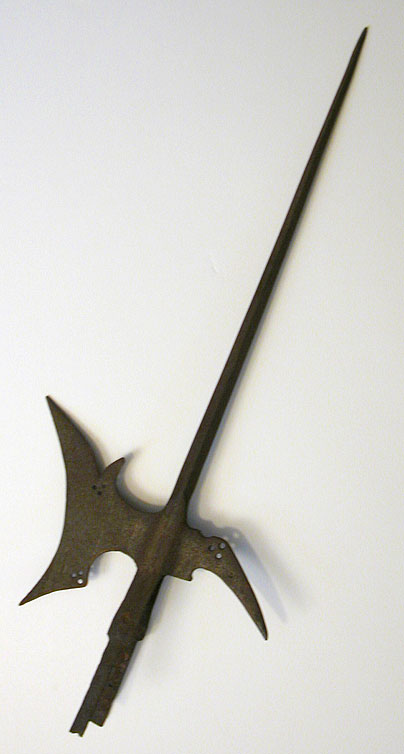
Posts: 1,191 Location: Kingston, Washington
Sat 05 Feb, 2005 7:54 am
Very cool object d'art, Keith! I had one (with wood still attached) some years ago that is very similar to this one, and it was purported to be from the Munich Civil Guards, late 16th Century. I would imagine that this one is in the same basic ballpark, being a weapon for some potentate's guard or another, perhaps a city militia unit. The painting "Night Watch" has, I believe, a rendition of one somewhat like this one in it, though I may well be misremembering. It looks GREAT for smacking around people in cloth, but a little light for the battlefield where your opponents may well be wearing some plate armour. Thus my suggestion that it's a Civil Guard type of weapon. Not a mere symbol of office, either, but a real weapon for crowd control.
So I'd hazard the guess of 1580-1630, maybe? Give or take a few decades... might be a tad earlier, but no earlier than 1550. How's that for a shotgun approach?
Good luck with your research!
Cheers,
Gordon
Posts: 1,563 Location: Upstate NY
Sat 05 Feb, 2005 8:40 am
Later halberds like this were made either for cerimonial/gaurd purposes or for use. If the two points of the blade and the point of the fluke are thickened (for better penetrative ability) then this ones for fighting if not then it was meant more for cemonial use. The really long top spike seems to have been a little more common/popular in Germany.
Posts: 237 Location: Sunny Southern California
Sat 05 Feb, 2005 10:27 am
Cool, thanks guys. I've got some good books out and later on today (assuming the kid takes a nap) I'll get out my lights and take a few extra photos. And also my calipers and do some measurements of thickness. This is one of those pieces where I really enjoyed looking at it, studying it, then suddenly flashed on how it would feel to have it ripping through my body. Shudder. Sheesh, we can be a creative species when it comes to ripping each other apart... Gives me the willies... ;)
But it's still really cool... ;)
Man, I love this stuff.
Oops, gotta go see if I can get the kid to put her pants back on. Remember that old song "the streak"? "the fastest thing on two feet..." That's my girl, running butt-naked...
Posts: 455 Location: Thailand
Sat 05 Feb, 2005 6:36 pm
Hi Keith,
Neat halberd head! I agree with Alan for a German origin on this one. My first thought was that it was Italian, but he's right about the length of the spike, and it just doesn't have the same feel that the Italian ones do (talk about subjectivity!).
I've got a couple of these in storage, and both of mine are probably Italian. Both have the thickened tips for can opening, and one retains traces of etched floral designs overall.
--ElJay
Posts: 237 Location: Sunny Southern California
Tue 08 Feb, 2005 9:19 am
Hey, guys, sorry for the late reply and thanks everyone for the feedback. The kid got a cold and I didn't get time to take photos of the piece until today. And I still haven't had time to hit the books myself. Anyway, I'm working on photos and measurements now and hopefully I'll get them up today.
Thanks again! Just wanted you guys to know I didn't duck and run after the replies... ;)
Posts: 237 Location: Sunny Southern California
Tue 08 Feb, 2005 9:55 am
Okay, more photos. First a new "overall" photo.
 Attachment: 17.31 KB
Attachment: 17.31 KB
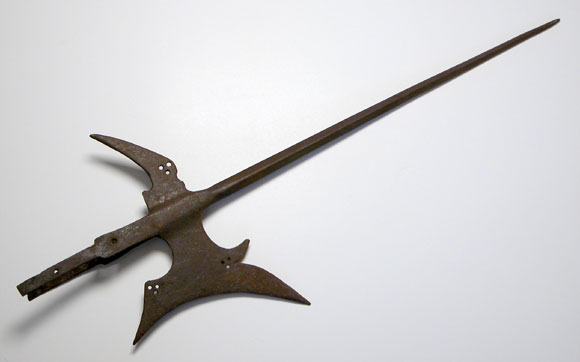
Posts: 237 Location: Sunny Southern California
Tue 08 Feb, 2005 9:56 am
Posts: 237 Location: Sunny Southern California
Tue 08 Feb, 2005 9:57 am
Posts: 1,563 Location: Upstate NY
Tue 08 Feb, 2005 10:00 am
Its a user Keith. See how the fluke(back spike) thickens twords the point for better penetrating . This feature is also very common on alot of indo persian weapons like katars. Nice piece!
Posts: 4,194 Location: Northern VA,USA
Tue 08 Feb, 2005 10:09 am
Very nice pics, Keith! Thanks!
Allan, I was just about to ask about that. It was suggested that this could have been a ceremonial piece, but I wasn't sure if I agreed. That fluke was one such reason. The long spike on top looks like it'd do quite nicely when thrusting into the armpit of a plate armored oponent as well as someone in lesser armor.
Posts: 237 Location: Sunny Southern California
Tue 08 Feb, 2005 10:19 am
Thanks, guys. Yeah, it is a nice piece to my inexperienced eye. I suppose it has a lot of things that remind me greatly of well done Japanese polearm weapons. Especially things like what we call jumanji yari -- spear heads with a main center blade (usually a bit different from this, but the same idea) and two side blades that came out at 90 degrees then curved forward. A lot of the tapers and shapes remind me of what you see in blades that were made for "serious" use. Tapers, curves, support in all the right places, etc. Amazing how subtle this all gets. And also how similar disparate cultures can be. Even though the overall shape, design, etc. between east and west is very different, when you look closer, well, the same lessons seem to apply across the board. Very cool.
One thing has been running around the back of my head. There are piercings on Japanese sword guards something that were there for very specific reasons. Some for utility knives, other types (udenukiana for instance) were there for rather pragmatic and reasons other than just "being pretty". Is there any significance to the triple piercings on the "blades" of this piece?
Okay, gotta run (kid back to the doctor for a check up) but when I get back, measurements.
Posts: 1,563 Location: Upstate NY
Tue 08 Feb, 2005 11:33 am
Keith, that i'm aware of the holes are just decoration. I had the same thing on my Italian halberd head . I've seen this used into the 18th century on the halberds carried by sergents.
Bill according to everything i've read the cerimonial version of this halberd would have looked identicle but lacked the thickening to the fluke and blade points. The nicest examples( bodygaurds of major European nobility or to be carried in parades to commemorate specific events like coranantions) were heavily etched with all sorts of floral sprays and whatnot
and in the case of commemorative arms often had the year etched into them.
Posts: 1,248 Location: New Mexico
Wed 09 Feb, 2005 2:41 pm
How much does it weigh?
Posts: 146
Fri 11 Feb, 2005 6:09 am
I don't know enough to offer my own opinion on the holes, but I seem to remember Bob Reed writing that the trefoil design had a religous signifigance... :confused: If my memory serves, then I'd speculate that they stand for the Holy Trinity.
I'd suggest dropping him an e-mail or a PM to find out, because the three-hole pattern is extrordinarily common in later-period western european weapons.
You
cannot post new topics in this forum
You
cannot reply to topics in this forum
You
cannot edit your posts in this forum
You
cannot delete your posts in this forum
You
cannot vote in polls in this forum
You
cannot attach files in this forum
You
can download files in this forum




